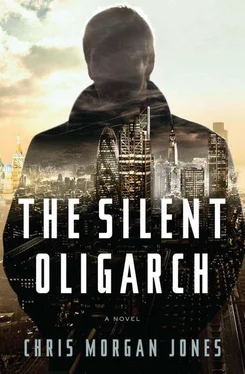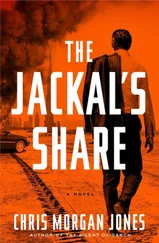Lock stood up. Webster went on.
“Was it part of the plan, to bolt? Or blind panic? Or would your wife not let you stay?”
Without looking at Webster, Lock walked away between tables and out the door. His mug was still full of tea. Webster saw his face through the window as he turned onto the street. There was no trace of insult there, no anger; only fear, like a man pursued.
Webster drummed his fingers on the tabletop in thought. Ten more minutes with him was all he needed. He put his phone back together and waited for it to warm up. He needed to call Black and let him know that Lock had left and was heading east on Church Street. His tea was still warm, and he sat with the thick white mug in his hands. He could go after Lock now, catch up with him along the street, or he could find him later, let his thoughts do the work. But it had to be today.
His phone chimed awake, and as he picked it up the bell above the door jangled. Lock stood in the doorway with an odd look of contrition on his face. Webster looked up as Lock threaded his way between orange plastic chairs and sat down again. For a moment neither man spoke.
“Can we discuss me?” Lock said at last.
Webster gave a small, understanding nod. “I think we should.”
“I… I went to church this morning. That beautiful one on George Street. Do you know it?” Webster shook his head. “You should go. Walk through the door and it’s like being in Italy. I thought that if I told someone everything then perhaps… But I couldn’t find a priest. And I wasn’t sure what I was there to confess.”
“Sins of omission?”
“Possibly. Yes. I have omitted rather a lot.”
For the next half hour, Lock talked. He talked about Cayman, and the horrifying specter of the FBI. He talked about Malin and his growing impatience, about the bodyguards and the prison that Moscow had become. He talked about Gerstman, and the terror that still struck him whenever he imagined his death. He left very little out.
It seemed to do him good. Webster listened closely, interrupting with the occasional question, and it occurred to him as Lock revived a little that in some respects his own profession was not so different from his wife’s. He had felt this before, the beginnings of a strange dependency, a stranger intimacy. Each needed to trust the other, whether that was wise or not.
Then it was his turn. He told Lock what he knew about Malin, and what the FBI would come to know. Lock interjected that the Swiss were also interested, so he thought, and Webster said there would probably be more. He laid out what would happen next: how charges would be drawn up and international arrest warrants issued; how Lock would be forced to remain in Russia; how the newspapers, frankly quiet until now, would feed happily on it for months. He began to remind Lock of the precedents, the helicopter crashes, the drive-by shootings on motorbikes, until Lock cut him short.
And then he described the alternative. Cooperate with law enforcement. Engage independent lawyers. Work against Malin; expose him. Go to prison, perhaps, but claim some small piece of your life as your own.
Throughout, Lock sat and listened, nodding occasionally as if to stay in touch from somewhere far away. He seldom looked at Webster; he stared at the table, out the window, at the other people in the café, which was busier now. He was still in his coat, and underneath its bulk his body looked shrunken and collapsed. When Webster was done he sat nodding steadily for several moments.
“The trouble is,” he said, finally looking at Webster, “I don’t think I know enough to be of use.”
“What do you mean?”
“I don’t know enough. Never have. Kesler explained it to me. To hurt Malin you need to show he’s a criminal. I don’t know he’s a criminal. Or I can’t prove it. I just know that he’s a rich Russian and I own things for him.” He leaned back and tried to find something in his trouser pocket; it sounded full of change. Eventually he pulled out a small plastic rectangle and held it up for Webster to see. “On here is everything I know. Every document from my files—every transfer, every company, every instruction. I thought I should have it all somewhere safe in case I needed it. But the funny thing—do you know what it is?”
“No.”
“The funny thing, is that it’s so clean. Money goes from here to there, it buys things, it grows, but I don’t know where it’s from. Fifteen years I’ve been doing this and I don’t know—have no idea”—Lock beat out the syllables on the table with the flat of his hand—“where any of it comes from. I guess, like you guess. But I don’t know.”
Webster felt his stomach lift and fall. “So what did Gerstman know?”
“Did you know him?”
“I saw him before he died.”
Lock frowned a little, as if he was thinking something through for the first time. “So it was you.”
“I like to think it wasn’t. He wouldn’t speak to me.”
“Do you know how he died?”
“I have an idea. He didn’t strike me as the type to kill himself. Or to do it in that way. So either he knew something, or it was a message.”
“To me.”
“Perhaps.” Webster watched Lock take this in. Either way, he thought, one of us precipitated his death. He didn’t say it. “So what did he know?”
“More than me, I suppose. He was a Russian, for a start. He knew where the money came from. Or some of it.”
“Enough to make him dangerous?”
“Dmitry was much too clever to be a danger to those people. He did everything he could to show Konstantin that. I thought he believed him.”
Webster waited a second or two. His fingers drummed on the table, his foot tapped on the floor. There was a gamble in this next move, since it was still possible that Lock was here on Malin’s behalf. Look at him, though, with the livid dark bags under his eyes and the fear in his face; he needs me.
There was something he had to clear first. He looked Lock in the eye. “Tell me. Do you remember an article about Faringdon? From ten years ago. In English. The only one there’s really been. It said that you were buying things for the Russian state.”
Lock frowned, as if rooting through his memory. “No. There’s never been anything. Not until you started.”
“It was by a friend of mine. A Russian woman.”
“No.” Lock shook his head. “I would have remembered. Is it important?”
Lock was no actor; his face was empty; it meant nothing to him.
“Probably not.” It was strange how a single piece of information could suddenly reveal a person. In that moment Webster understood that Lock was not the sort of man to be told things, but the sort who serves a purpose. A standard component of a more complex mechanism. The realization freed him. “I went to see Nina Gerstman.”
Lock sat back and crossed his arms. “Was that decent?”
Webster shrugged. “I thought I could help her. She thinks it was Malin.”
“Of course it was Malin. How does that help?”
“Perhaps we can show that it was.” Lock waited for Webster to go on. “I think that Dmitry had some sort of file on Malin. I also think that someone searched his flat a week or so before he died. Prock mentioned it but thought I wouldn’t understand. Do you know Prock?”
Lock shook his head. “No.”
“Dmitry’s partner. An unlikely match.” He paused. “Maybe she’d show it to you.”
“Nina?”
“Yes.”
“Why would she show it to me?”
“Because you’re the man who can bring down her husband’s killer. Because Dmitry liked you.”
Lock sighed, exhaling through his nose and mouth. “You’re sure there’s something there?”
“I think there is. Something that will hurt Malin. It doesn’t make sense otherwise.”
Читать дальше












